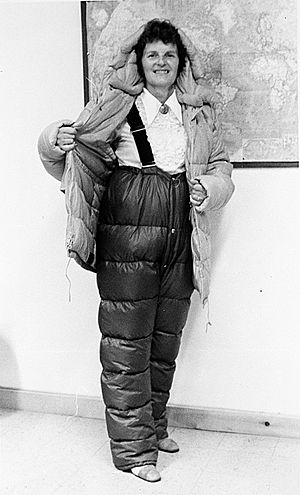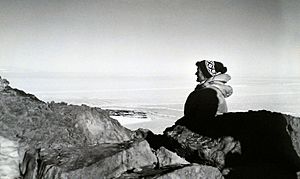Ursula Marvin facts for kids
Quick facts for kids
Ursula B. Marvin
|
|
|---|---|

Marvin in 1978
|
|
| Born |
Ursula Bailey
August 20, 1921 Bradford, Vermont, U.S.
|
| Died | February 12, 2018 (aged 96) Concord, Massachusetts, U.S.
|
| Education | Tufts University, Harvard University-Radcliffe |
| Known for | Continental Drift: Evolution of a Concept |
| Spouse(s) | Thomas Crockett Marvin |
| Awards | Lifetime Achievement Award from Women in Science and Engineering |
| Scientific career | |
| Fields | Planetary geology |
| Institutions | Smithsonian Astrophysical Observatory |
Ursula Bailey Marvin (born August 20, 1921 – died February 12, 2018) was an amazing American scientist. She studied planets and rocks from space, which is why she is called a planetary geologist. She also wrote books and worked at the Smithsonian Astrophysical Observatory.
Ursula Marvin won many important awards for her work. In 1997, she received the Lifetime Achievement Award from Women in Science and Engineering. She also won the History of Geology Award in 1986 from the Geological Society of America. A small mountain in Antarctica, called Marvin Nunatak, and an asteroid (4309) Marvin are named after her!
| Top - 0-9 A B C D E F G H I J K L M N O P Q R S T U V W X Y Z |
Early Life and Education
Ursula Bailey was born in Bradford, Vermont, on August 20, 1921. Her parents were Harold Leslie Bailey and Alice M. Bailey. Growing up near the White Mountains in New Hampshire, she loved being outdoors. She remembered beautiful pink and purple sunsets.
At first, she studied history at Tufts University. She took a geology class to meet a science requirement. But she loved it so much that she wanted to change her major! Her professor told her she should learn to cook instead. But Ursula was determined. She added geology, math, and physics courses to her studies. She earned her bachelor's degree in history from Tufts in 1943. Later, she got her master's degree in geology from Harvard University-Radcliffe in 1946.
Career and Discoveries
After World War II, Ursula moved to Chicago. She worked as a researcher at the University of Chicago with Julian Goldsmith. She was briefly married to Lloyd Chaisson.
She then went back to Harvard to work on her Ph.D. in geology. While there, she worked with her second husband, Thomas Crockett Marvin. They got married in 1952. From 1953, they traveled to Brazil and Angola to search for valuable ore deposits.
When they returned to the United States in 1958, Ursula taught about minerals at Tufts for two years. Then, she got a job researching meteorites at Harvard. In 1961, she became a permanent researcher at the Smithsonian Astrophysical Observatory. She finally earned her Ph.D. in geology from Harvard in 1969.
Ursula Marvin wrote a book in 1973 called Continental Drift: Evolution of a Concept. She also wrote over 160 research papers! Her main work in planetary science was studying meteorites and samples from the Moon. She looked at how the Sputnik 4 satellite changed over time in space. This helped her understand how iron meteorites change.
She was also involved in many studies of samples brought back from the Moon. These samples came from American missions like Apollo 12, Apollo 15, and Apollo 16. She also studied samples from Russian missions, Luna 16 and Luna 20.
Ursula traveled to Antarctica three times for early ANSMET surveys. These surveys look for meteorites on the ice. She was the first woman on the American team to do research there. She also analyzed the first lunar meteorite ever found, called Allan Hills A81005. Because of her important work in Antarctica, a small mountain there, Marvin Nunatak, was named after her.
She also helped her old university, Tufts University. She was a trustee there from 1975 to 1985. She was later an emerita trustee, meaning she was still honored for her service.
Awards and Honors
Ursula Marvin received many special awards and recognitions:
- 1997: Lifetime Achievement Award from Women in Science and Engineering.
- 1986: History of Geology Award from the Geological Society of America.
- 2005: Sue Tyler Friedman Medal.
- 2012: Service Award from the Meteoritical Society.
- A small mountain in Antarctica, Marvin Nunatak, is named in her honor.
- Asteroid (4309) Marvin is also named after her.
See also
 In Spanish: Ursula Marvin para niños
In Spanish: Ursula Marvin para niños
 | Audre Lorde |
 | John Berry Meachum |
 | Ferdinand Lee Barnett |


